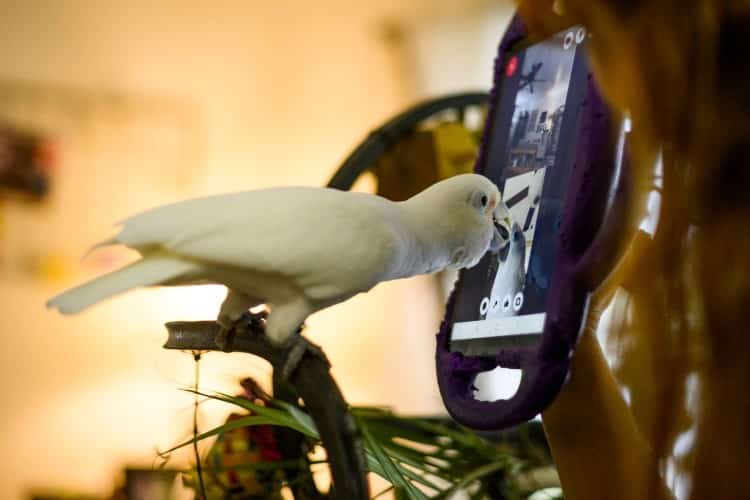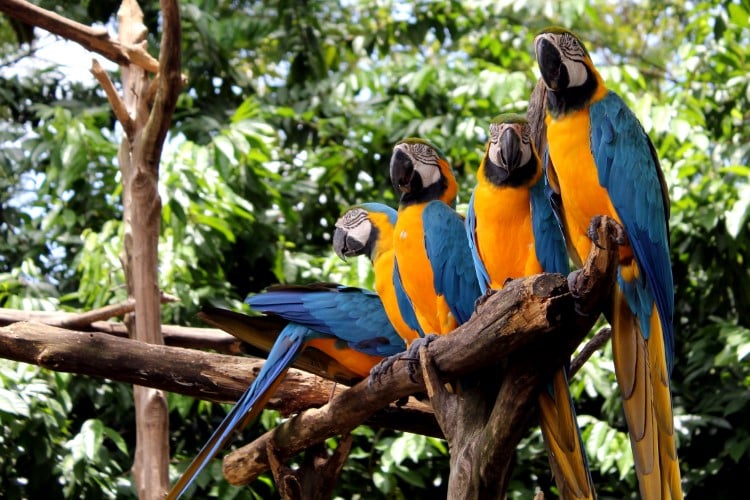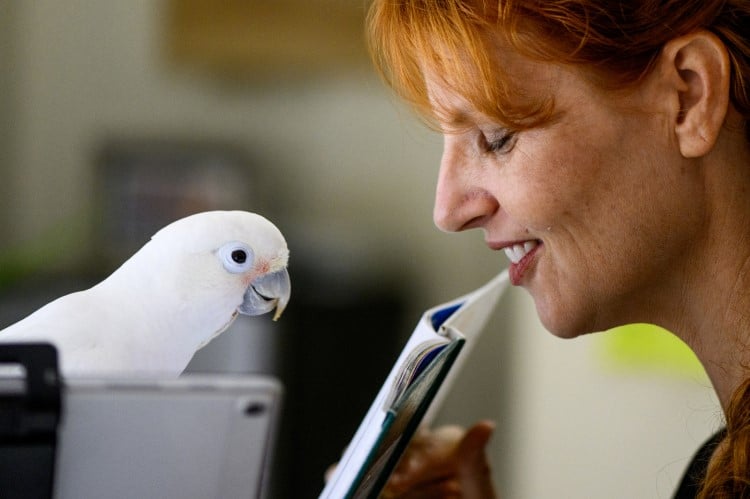Parrots Taught to Video Call Each Other Show Increased Happiness According to New Study

Photo: Matthew Modoono/Northeastern University
Researchers have found that some birds love firing up a video call just as much as we do. This shouldn't come as a surprise, as in the wild, birds live in flocks. Loneliness can be a real problem for pet birds, so scientists from Northeastern University wanted to see if video chatting with other birds could improve their quality of life. The results are astounding.
A group of 18 parrots ranging from cockatoos to African grey parrots were trained by their owners to hit a bell when they wished to engage in a call. They were then shown a range of images of different birds in the study and allowed to make up to two five-minute calls during a three-hour window. While treats were used initially to train the birds on the bell, they were not subsequently involved.
Incredibly, the researchers found that strong bonds formed between many of the birds, with the parrots displaying preferences for who they wanted to call. Not only did the researchers observe call-and-response vocalizations similar to behavior in the wild, but many owners saw their birds pick up new skills from their friends. This includes foraging, flying, and even new vocalizations. One owner even commented that they saw their bird “come alive” during the chats.
The birds were closely monitored by their humans during the calls, who were instructed to end the video if the birds walked away or showed any signs of distress. Though three birds from the initial group dropped out of the study, the remaining 15 had an overall positive experience. In fact, parrot behaviorist and Northeastern researcher Jennifer Cunha says that her Goffin's cockatoo is still—over a year later—chatting with an African grey from the study.
For Rébecca Kleinberger, assistant professor at Northeastern, the study was a wonderful way to improve the quality of life for these animals. She noted that parrots have only been kept as pets for the past one or two generations and are not domesticated in the same way that cats or dogs are. By keeping them connected with their peers, the owners are enriching their lives.
“We’re not saying you can make them as happy as they would be in the wild,” she says. “We’re trying to serve those who are already [in captivity].”
The researchers note that there are many reasons—including disease—why some parrots in captivity can't live with other birds. For these animals, the videos provide an important outlet that was exemplified by two elderly macaws in the study. These two sickly males were paired together, and their bond was immediate. While they hadn't seen another macaw for most of their lives, they loved dancing and singing together. They would even call out, “Hi! Come Here! Hello!” when one would move off the screen.
“It really speaks to how cognitively complex these birds are and how much ability they have to express themselves,” says Ilyena Hirskyj-Douglas, an assistant professor at the University of Glasgow who collaborated on the study. “It was really beautiful, those two birds, for me.”
Researchers from Northeastern University wanted to see if parrots would be interested in video chatting with other birds.

Photo: Matthew Modoono/Northeastern University
The results were overwhelmingly positive, with birds happily chatting away. Many are still in touch even after the study ended.
Parrots are social animals, but there are many reasons why some cannot live in captivity with other birds.

Photo: tehcheesiong/Depositphotos
The study is an interesting look at how parrot loneliness can be tackled thanks to closely supervised calls.

Photo: Matthew Modoono/Northeastern University
Watch this video to see the full training process and how the birds reacted during their calls.
h/t: [Northeastern Global News]
Related Articles:
New UK Laws Will Recognize Animals as Sentient Beings
Study Finds That 65 Different Species of Animals Laugh To Express Happiness
This African Gray Parrot Is the First Animal To Ever Ask an Existential Question
Staff Allow Curious Penguins to Explore Empty Aquarium and Meet the Other Animals
READ: Parrots Taught to Video Call Each Other Show Increased Happiness According to New Study


0 Commentaires